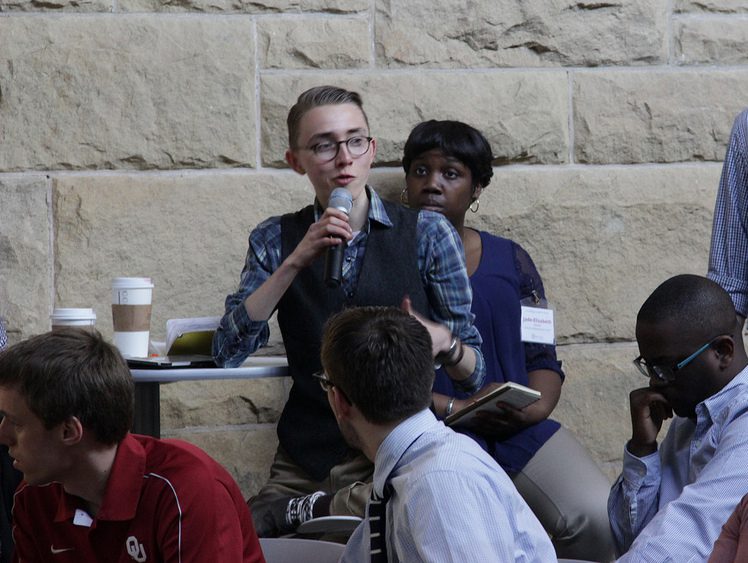The firestarter

Getting people to talk about making the world a better place isn’t a problem on college campuses. Getting them to make it one can be a bit more challenging.
That disconnect isn’t necessarily a product of weak will, however. The lack of action could result more from the absence of an infrastructure providing opportunity to achieve such a difficult-to-attain goal.
Furman is about to find out which it is.
This spring, rising junior Ben Riddle became one of 110 University Innovation Fellows from 78 schools across the country. The program, run by the National Center for Engineering Pathways to Innovation (Epicenter), funded by the National Science Foundation and directed by Stanford University and the National Collegiate Inventors and Innovators Alliance, “offers undergraduate students in engineering and other fields the guidance and support to become agents of change on their home campuses.”
Riddle was chosen through an applications process, and he had to be sponsored by faculty and administrators from Furman—specifically art department chair Ross McClain and David Ellison of the Board of Trustees. Following acceptance, Riddle completed six weeks of online training before attending the annual meeting March 22-24 in Silicon Valley.
“Epicenter is powering U.S. undergraduate and engineering students to bring their ideas to life for the benefit of our economy and society,” the Web site says, which sounds impressive if a bit nebulous. To Riddle, however, the mission is clear.
“I feel like too often in the liberal arts we stop at this notion of understanding the problem and then talking about it and talking about it and talking about it to death, and we don’t ever do anything about it,” he says with his ever-present smile. “Design is the way for us to actually do something.”
But what? Well, that’s not up to Riddle to decide. He has his causes—poverty in Greenville being one—but the role is to create an environment at Furman where people with ideas can find ways to bring them to fruition.
That could include working with faculty to add new courses, convincing Furman to host events and workshops and, perhaps most importantly, creating a space on campus dedicated to bringing problem-solvers together—all while leaning heavily on the other fellows from across the nation for ideas and inspiration.
Positive change has been Riddle’s modus operandi since he was in high school in Greenville, and when he heard about the Epicenter program he made it his mission to become involved. Furman’s representation in something that was created to get the most out of engineers is unusual in and of itself for no other reason than the fact that Furman doesn’t even have an engineering program, but those credentials as a small, liberal-arts institution could be just what those science guys at other places need.
“What’s interesting is I think humanities majors get it because we’ve seen for hundreds of years different philosophies on what is the proper way to live life, “ he says. “How does Furman play a role here? I think in the national movement we can reassert the value of the liberal arts in the modern world.”
Riddle’s involvement may be even more surprising, however, because conventional wisdom indicates he shouldn’t even be a Furman student.
“I didn’t think I was Stanford smart, but I got in and was really caught off guard because I always thought I would go here,” he said with, you guessed it, a smile. “Stanford’s school of design thinking was something that really inspired me. I found that (Stanford) was what I thought it was going to be, but I knew if the ideas that drew me to a place were valuable and valid they could be adapted elsewhere too. I wanted see what it would be like to create a similar experience in Greenville.”
Turning Greenville into Palo Alto may take a while, but Riddle sees a world full of possibilities and has already created a blueprint called “Furman on FIRE: Fueling Innovation, Research & Entrepreneurship.”
“I think where we’re not hitting the road right now with the product is the practice,” he says. “That’s the need with the fellowship: We really reframe our education around very applicable, very tangible outcomes and not just theory. “
“Ben is incredible in that he has not yet met a stranger. He is basically a young person with a 40-year-old mind. He’s so ahead of it, and he’s so well-spoken,” McClain said. “There are like-minded kids out there, and all we need to do is get them together and support them. I’ve never been as excited about something since I got out of grad school. . . And what’s fun is I don’t even know what it’s going to be.”
Neither does Riddle, but he’s thinking big.
“Really all of this is for nothing if more students don’t wake up and do the same. It’s not about one person or one award or one fellowship; it’s about that being a catalyst for many,” he said. “I’d love to see 20 years down the road Furman being known as a place where crazy stuff is happening because these kids just get turned on and all of the sudden they’re going out and starting fires all over the world.”
View more photos from the University Innovation Fellows Meetup 2014.